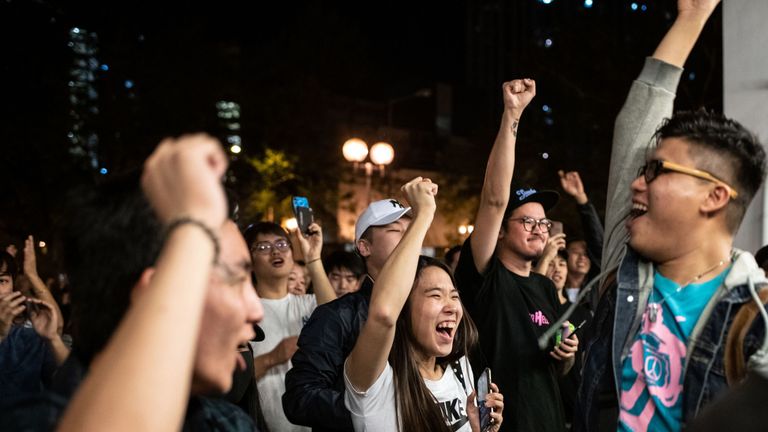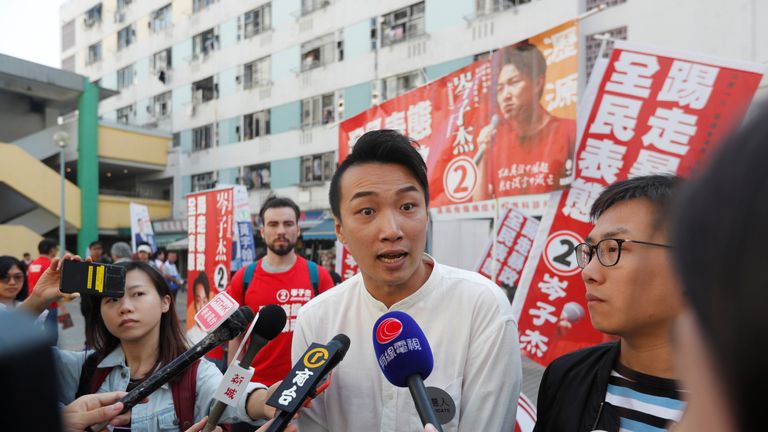Home » World News »
Hong Kong council elections: Pro-democracy candidates record huge victory
Pro-democracy candidates in Hong Kong have scored a huge victory in district council elections, which have left them in control of all but one of the local authorities that were up for grabs.
Seventeen of the 18 district councils in the territory are now in the hands of pro-democracy councillors, having been victorious in 347 of the 452 available seats, according to the South China Morning Post.
The newspaper reported that pro-Beijing candidates trailed well behind with 60 seats, while those standing as independents – many of whom were pro-democracy – won 45 seats.
It represents a huge increase for pro-democracy candidates, who won around 100 seats four years ago. The poll recorded its highest ever turnout at 71% – up from 47% and equating to almost three million people.
The elections, which also attracted a record number of candidates at 1,104, had taken on new significance because of months of clashes between Hong Kong authorities and protesters.
Huge numbers of people have been demonstrating what they say is an erosion of freedoms in the territory by China, which saw many of its political heavyweights trounced.
One of those was Junius Ho, who was stabbed with a knife while campaigning this month.
On the other side, among the winning candidates were rally organiser Jimmy Sham, who was beaten by people with hammers last month, and a candidate who had part of his ear bitten off by an attacker.
It remains to be seen whether the results force the Chinese government to rethink how to handle the ongoing unrest, which is now in its sixth month and has become increasingly violent.
Hong Kong chief executive Carrie Lam said the government respected the outcome and “will listen to the opinions of members of the public humbly and seriously reflect”.
She said she hoped the “peaceful, safe and orderly situation” in which the elections took place would continue.
While the councils have little power, winning candidates are demanding that Ms Lam now meet their demands, such as free elections for the leader of the city and legislature – and a probe into claims of police brutality.
One winner, Henry Sin Ho-fai, said: “We won a small battle today but it shows that Hong Kong people have a chance to win the war. We will fight on.”
Willy Lam, a political expert at the Chinese University of Hong Kong, said the historic results constituted “nothing short of a revolution”, but Beijing has showed no signs that it may soften its stance on the former British colony.
Chinese foreign minister Wang Yi told reporters during a visit to Tokyo on Monday: “No matter what kind of things happen in Hong Kong, Hong Kong is a part of Chinese territory.
“Any attempts to destroy Hong Kong or harm Hong Kong’s stability and development cannot possibly succeed.”
Failure by Beijing to change its stance may well result in a renewal of violent clashes, with voting having passed off peacefully despite long queues.
Petrol bombs and tear gas have become regular sights on streets, but during the council election, which is the only fully democratic one in Hong Kong, hardly anyone was seen wearing the masks associated with the protesters.
There were celebrations outside polling stations when the results were announced, and by lunchtime dozens of supporters had gathered in a business district for a victory rally.
Candidates for the Legislative Council elections next year will be drawn from the elected district councillors.
The victory will see the pro-democracy camp secure 117 seats in the 1,200-member pro-Beijing panel that elects the leader of the city every four years.
It will bolster their influence, as the bloc usually has more than 300 supporters on the panel but still falls short of the majority.
Since the protests began, more than 5,000 people have been arrested and the unrest has also contributed to the first recession endured by Hong Kong in a decade.
The local polytechnic university was the most recent flashpoint, with protesters trapped inside the main building as police blocked the exits, prompting some to abseil down from a bridge.
An estimated 30 protesters are still holding out at the campus, reluctant to leave for fear of arrest.
The unrest started over opposition to a law – eventually scrapped – that would have allowed people to be extradited to mainland China.
Many saw it as a sign of creeping Chinese control over Hong Kong, which is supposed to operate under a separate governing and economic system to that of Beijing under the so-called “one country, two systems” principle.
Hong Kong had been a British territory until 1997 and Foreign Secretary Dominic Raab said he hoped the election results would prompt a “political dialogue” that “respects the one country, two systems model”.
He added: “We don’t want to see any more violence. It was reassuring to hear Carrie Lam commit to reflecting seriously on the message delivered by the people of Hong Kong.”
While the protests began because of the proposed extradition law, the action later expanded to cover a general call for greater democracy in the territory.
Hong Kong government couldn’t look more out of touch after historic election – analysis by Stuart Ramsay, chief correspondent in Hong Hong
For the government and protesters alike, this remarkable election result raises difficult questions, perhaps the leading amongst them – what do we do now?
A hitherto widely ignored local poll that returns councillors with responsibilities for parks and bins has been transformed into a referendum on the governance of Hong Kong.
The clear message to the city’s chief executive, Carrie Lam, is that her belief that the silent majority of Hong Kongers were actually against the protest movements was a massive miscalculation.
The huge turnout spanning all ages and classes could not illustrate more clearly that the government is out of touch with the majority.
Read Stuart’s analysis in full
Source: Read Full Article







